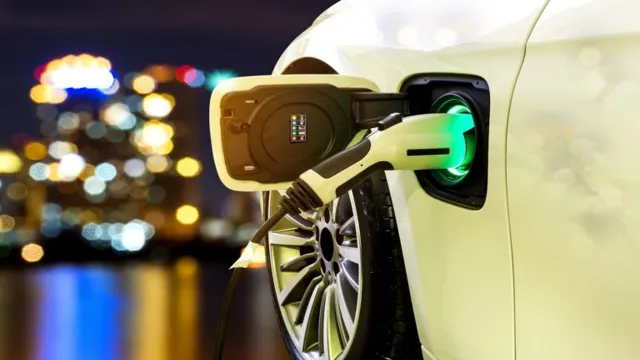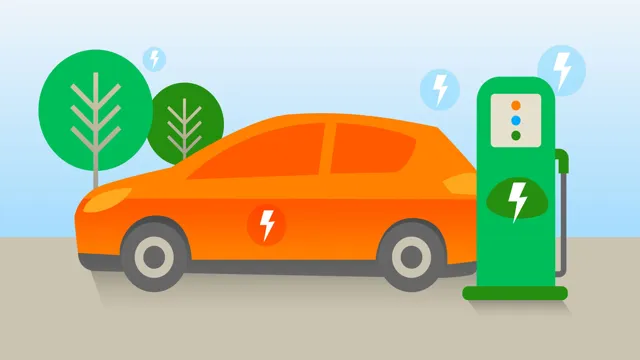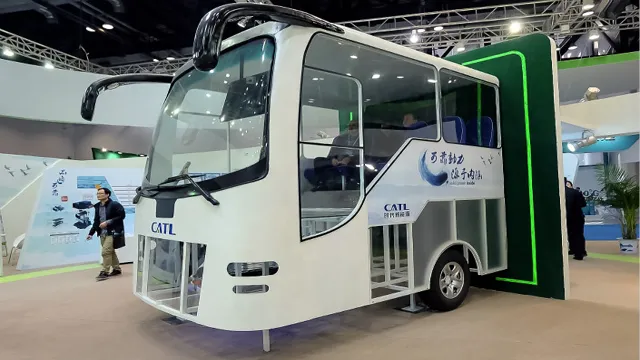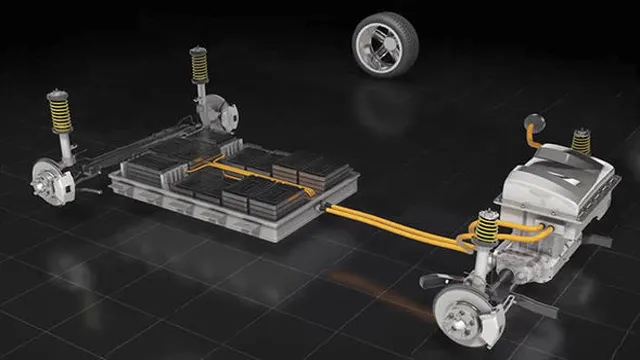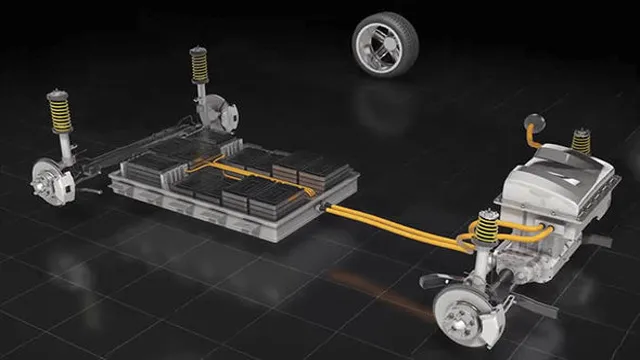Revolutionizing Transportation: The Power of Electric Cars and Complementary Technologies
Electric cars have become increasingly popular over the years as technology advances and people become more environmentally conscious. It’s no secret that electric cars are the future, with more and more manufacturers investing in the development of electric models. The demand for electric vehicles has grown exponentially in recent years and with this increase, it’s inevitable that we will see even more groundbreaking developments in the automotive industry.
But what does the future of electric cars really look like? With improvements in range and charging times, it won’t be long before EVs are competing with traditional combustion engines in terms of convenience. The days of worrying about running out of battery on long drives are quickly becoming a thing of the past. The prospect of a future where EVs dominate our roads brings with it exciting possibilities like improved air quality and a reduced carbon footprint.
But there are also challenges to overcome, including developing the infrastructure to support the growing number of electric vehicles on our roads. So, what’s next for electric cars? With continued investment in research and development, we can expect to see even more efficient and affordable electric vehicles hitting our roads, making it easier for everyday drivers to choose an eco-friendly option. Electric cars are the future, and it’s exciting to think about what that future holds.
Complementary Technologies for Electric Cars
Electric cars are becoming increasingly popular around the world, but with the rise in demand, comes the need for complementary technologies. One of the most important complementary technologies for electric cars is the charging infrastructure. Building more charging stations and increasing charging speed is essential for making electric cars more accessible and practical for people on the go.
Battery technology is also important for electric cars, as more efficient and durable batteries will extend the car’s range and lifespan. Additionally, smart grid technology can optimize energy usage by allowing electric cars to charge when energy demand is low and reduce demand when it is high. Other complementary technologies like regenerative braking systems and lightweight materials also play a role in extending the range and efficiency of electric cars.
As we continue to invest in these complementary technologies, we can make electric cars a more viable transportation option for the future.
Battery Technology
Battery technology has come a long way, but still has limitations when it comes to the range of electric cars. However, complementary technologies are emerging that can help extend the battery life of electric cars. One such technology is regenerative braking, which allows electric cars to harness the power generated during braking to recharge the battery.
Another technology in development is solar-powered cars. These utilize photovoltaic panels built into the car’s body to convert sunlight into electricity, which can then be used to power the car or charge the battery. Imagine never having to worry about finding a power source for your electric car! While these technologies may not fully solve the range issue, they are certainly steps in the right direction.

Wireless Charging Technology
Wireless Charging Technology Electric cars are becoming increasingly popular and with them comes the need for efficient charging technology. One complementary technology that has emerged is wireless charging. This technology allows drivers to charge their cars without the need for cables or outlets, making it more convenient and faster than traditional charging methods.
Imagine being able to park your car and have it instantly start charging without any effort on your part. That’s the beauty of wireless charging. It works by using magnetic resonance technology that transmits energy wirelessly to the car’s battery.
This eliminates the need for cords and plugs and also reduces wear and tear on the car’s charging port. While still in its early stages, wireless charging is quickly gaining popularity and could become the norm for electric cars in the future.
Smart Systems for Electric Cars
Electric cars have become incredibly popular in recent years, and as such, the need for complementary technology has risen. Smart systems are a fantastic and innovative solution that not only improve the functionality of electric cars but also contribute to a better overall driving experience. For instance, some smart systems automatically adjust the speed of the car based on the surrounding traffic to ensure safe and efficient driving.
Additionally, many electric cars now come equipped with built-in sensors to detect and avoid obstacles, making parking and reversing much easier and safer. Other smart systems can alert drivers to maintenance needs, such as when the car’s battery needs charging, or when tire pressure is low. All of these features work together to create a more integrated and streamlined experience for electric car drivers.
Ultimately, these smart systems not only make driving an electric car more convenient and enjoyable but also contribute to a greener and more sustainable future.
Internet Of Things (IOT)
Electric cars are the future of transportation, and with the Internet of Things (IOT), they are set to become even smarter. Smart systems for electric cars are being developed to provide drivers with more information and control over their vehicles. Sensors and data analytics are being used to monitor everything from battery life and performance to traffic conditions and weather.
This information is then fed back to the driver, allowing them to make more informed decisions about how and when they use their electric car. For example, a smart system might alert the driver to the nearest charging station or provide advice on the most energy-efficient route for a given journey. In this way, the IOT is enabling drivers to get the most out of their electric cars, making them more practical and sustainable alternatives to traditional gas-powered vehicles.
The future of electric cars is looking bright, and the IOT is at the forefront of making it a reality.
Artificial Intelligence (AI)
Artificial Intelligence (AI), smart systems, electric cars Artificial Intelligence (AI) plays a significant role in the development of smart systems for electric cars. Smart systems that involve AI technology can enhance the efficiency and performance of electric cars. These systems can help monitor battery health, optimize charging times, and improve driving range.
AI-powered navigation systems can also help drivers find the most efficient routes and avoid traffic. In addition, AI can be used to develop predictive maintenance systems, which can identify potential issues before they become major problems. This technology is still in the early stage of development, but it has the potential to revolutionize the electric car industry, making electric cars more reliable and popular than ever before.
With the rapid growth of AI, it will become increasingly important to integrate it into electric vehicles. As technology advances, smart systems will continue to improve, making electric cars an even more attractive alternative to gas-powered vehicles.
Blockchain Technology
Blockchain Technology, Smart Systems, Electric Cars Blockchain technology has revolutionized the way we think about smart systems for electric cars. With the help of blockchain, we can create systems that are more secure and efficient. The decentralized nature of blockchain ensures that there is no single point of failure, making it almost impossible for hackers to compromise the system.
Additionally, blockchain allows for more transparency in the charging process, as transactions can be monitored and recorded on the blockchain ledger. This not only makes it easier for consumers to track their usage and spending but also helps to prevent fraud. Furthermore, blockchain technology allows for the creation of peer-to-peer systems that enable electric car owners to share electricity and earn money by doing so.
These smart systems have the potential to transform the way we power our electric cars, making them more accessible, reliable, and sustainable. With the use of blockchain technology, we can ensure a more secure and efficient future for the world of electric cars.
Energy Solutions for Electric Cars
As we continue to see more and more electric cars on the road, it’s becoming increasingly clear that complementary technologies will be necessary in order to support this growing trend. One of the biggest challenges facing electric vehicles is the limited range that they can currently travel on a single charge. This is where energy solutions come into play.
Technologies such as wireless charging pads and fast charging stations can help to extend the range of electric cars and make it more convenient for drivers to top up their batteries on the go. Additionally, the development of more efficient battery technologies, such as lithium-sulfur batteries, could make it possible for electric cars to travel even further on a single charge. Ultimately, taking a holistic approach to addressing the challenges facing electric cars will be key to ensuring their widespread adoption and success in the years to come.
Solar Panels
Solar panels are becoming an increasingly popular solution for powering electric cars as we strive for a more sustainable future. By harnessing the power of the sun, drivers can avoid relying on fossil fuels and reduce their carbon footprint. Solar panels can be mounted on the roof of an electric car, providing an additional source of energy that can extend its range.
This means that instead of constantly searching for the nearest charging station, drivers can rely on the sun to power their vehicle for free. Solar panels not only provide an environmentally-friendly solution, but they can also save drivers money in the long run by reducing their reliance on expensive charging stations. When considering energy solutions for your electric car, solar panels are a reliable and efficient option that can provide a much-needed boost to your vehicle’s range while also reducing your impact on the environment.
Energy Storage Systems
Electric cars are becoming increasingly popular, and for good reason. They are cleaner, quieter, and cheaper to operate than traditional gas-powered vehicles. However, one of the biggest challenges faced by electric car enthusiasts is range anxiety.
This is where energy storage systems come in. By storing excess electricity in batteries or other devices, these systems can provide a reliable and long-lasting source of power for electric cars. This means that drivers can travel further without worrying about running out of charge.
Additionally, energy storage systems can help stabilize the power grid by absorbing excess electricity during times of low demand and releasing it during times of high demand. This leads to a more efficient and reliable energy system for everyone. If you are considering purchasing an electric car, be sure to look into energy storage solutions to help you get the most out of your vehicle.
The Benefits of Complementary Technologies
Electric cars are one of the most prominent examples of complementary technology in modern times. Although electric vehicles have many benefits, such as being environmentally friendly and cost-effective, they also have limitations when it comes to range and charging time. To address these limitations, complementary technologies like charging infrastructure and battery technology have emerged.
Charging infrastructure includes fast charging stations and extensive coverage across cities, while battery technology has made significant advancements in energy storage and density. These complementary technologies have helped electric cars become more practical and mainstream, as they address the concerns of range anxiety and charging times. The development of complementary technologies is an essential aspect of technological progress, as it helps fill the gaps and limitations of new technologies, enabling them to reach their full potential.
Conclusion
In conclusion, electric cars are not just the future of transportation, but rather a complementary technology that will revolutionize the way we live and move. From renewable energy sources, smart charging systems, to self-driving features, electric cars are paving the way for a more sustainable and efficient future. So whether you’re a tech enthusiast, an eco-warrior, or simply a driver looking for a smoother and more cost-effective ride, electric cars have got you covered.
So buckle up, plug in, and enjoy the ride into the future of mobility!”
FAQs
What is complementary technology in the context of electric cars?
Complementary technology refers to the supporting infrastructure and technologies necessary to enable the widespread adoption of electric cars. This includes charging stations, battery technology, and smart grid systems.
How do advancements in complementary technology impact the growth of electric cars?
Advancements in complementary technology, such as the development of more efficient batteries and an expanded network of charging stations, can help lower the cost and increase the convenience of electric cars, which can lead to higher adoption rates.
What are some potential challenges to the development and implementation of complementary technology for electric cars?
Some potential challenges include high upfront costs, limited availability of charging stations in certain areas, the need for government policies to support the development of necessary infrastructure, and the potential strain on electricity grids during peak charging times.
How does complementary technology differ from other types of technology in the automotive industry?
Complementary technology differs from other types of technology in the automotive industry in that it is not directly integrated into the vehicle, but rather supports the overall system that enables the widespread adoption and use of electric cars. Examples of other types of technology in the automotive industry include safety features, automated driving systems, and entertainment systems.
